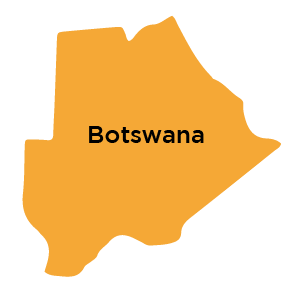
Botswana
Botswana, formerly a British protectorate, became independent in 1966. It is a landlocked country in southern Africa, bordered by Zimbabwe to the north-east, South Africa to the south-east, and Namibia to the west. The so-called Caprivi Strip of Namibia extends along its northern border.
- Capital: Gaborone
- Currency: Pula
- Population: 2.0 million
- Area: 581 730 km²
- GDP $ : $9.054 trillion
- Internet domain: .bw
- Languages: English, Tswana (official language)
- Exports: Foodstuffs; vehicles and transport equipment; textiles; petroleum products; wood and paper products; metal and metal products
- Imports: Diamonds; copper; nickel; beef; soda ash; textiles
Botswana is a member of the ARIPO (Banjul Protocol), the Madrid Protocol, the Paris Convention and the WTO/TRIPS.
The Act expressly provides that, by the registration of a trade mark, the owner acquires the exclusive right to the mark, in the sense that only the owner can authorise other persons to use the mark. Provision is made for the registration of trade marks in respect of goods and services, and for collective marks.
Trade mark protection may be obtained by way of a national filing in Botswana; or by way of a convention application claiming the priority of an earlier application in a convention country; or by way of an ARIPO registration.
Although Botswana has also acceded to the Madrid Protocol, the current domestic laws have not been amended to provide for trade mark registrations via the Madrid Protocol. Accordingly, it is not certain whether enforceable rights can at this time be obtained in Botswana via a Madrid registration. (The Industrial Property Act, 2010, which has not yet been put into effect, provides for applications under the Madrid Protocol.)
Types of trademarks registrable
Goods and service marks. Color marks are also registrable.
A single application may cover more than one class of goods and/or services
Documents required for trademark registration
- A simply signed Power of Attorney
- Prints of the mark
- Specification of goods/ services
- Full details of the applicant
- Certified copy of the priority document (if applicable)
Renewals
Valid for an initial period of 10 years counting from the date of filing
Renewable every 10 years
Documents Required for Assignment Applications
- Power of Attorney simply signed
- Deed of assignment
Change of Address/Name Applications
- Power of Attorney
- Certificate of Change of Name or extract of the Company Register evidencing the change
License Applications
- Power of Attorney simply signed by the Licensor and Licensee
- License Agreement
Botswana is a member of the Paris Convention, ARIPO (Harare Protocol), the PCT and the WTO/TRIPS.
Botswana has implemented the Harare Protocol (which regulates patent and design filings in ARIPO) in its national laws, thereby giving valid patent protection to applicants seeking to obtain a patent via an ARIPO application. Accordingly, patent protection is currently available by way of a national filing or via an ARIPO application designating Botswana.
Botswana is a member of the Patent Cooperation Treaty (PCT); however, at the present time the domestic laws have not been amended to provide for the PCT. Therefore, although it is possible to file PCT applications designating Botswana, it is not clear whether enforceable rights will at this time be obtained by patents granted on PCT national phase filings in Botswana. The Industrial Property Act, 2010, which has not yet been put into effect, provides for PCT applications.
Filing Requirements
NON-PCT Applications
- Simply signed power of attorney
- Specifications, claims and abstract
- Formal drawings
- Priority document
- Assignment of Priority rights
National Phase PCT Application
- Simply signed power of attorney
- International Search Report
- International Examination Report
Botswana is a member of the Paris Convention, the ARIPO (Harare Protocol), the Hague Agreement and the WTO/TRIPS.
Botswana is a member of the Paris Convention, the ARIPO (Harare Protocol), the Hague Agreement and the WTO/TRIPS.
Botswana is also a member of the Hague Agreement, so that design protection can theoretically be obtained by way of an international application under the Hague Agreement designating Botswana. However, Botswana has not yet introduced enabling domestic legislation to provide for such international applications, so that it is not certain whether enforceable rights can at this time be obtained by way of such an international application. The new Industrial Property Act, 2010, which has not yet been put into effect, provides for applications under the Hague Agreement.
Documents required for application
- A form
- A request
- Drawings
- Photographs
- Statement
- Specimen of article
Recordal of assignment/ license
- A form
- A request
- License or agreement
Recordal of change of name/address
- A request
- Form
Botswana is a member of the Berne Convention, the WIPO Copyright Treaty, the WIPO Performances and Phonograms Treaty, and the WTO/TRIPS.
Copyright protection applies to ‘works’, which are defined to include literary and artistic works which are original intellectual creations, as well as derivative works.
Literary and artistic works are defined to include:
- books, pamphlets, articles, computer programs and other writings
- speeches, lectures, addresses, sermons and other oral works
- dramatic, dramatic-musical works, pantomimes, choreographic works and other works for stage productions
- expressions of folklore
- musical works
- works of architecture
- works of drawing, painting, sculpture, engraving, lithography, tapestry and other works of fine art
- photographic works
- works of applied art
- illustrations, maps, plans, sketches and three-dimensional works relating to geography, topography, architecture or science.
Derivative works include:
- translations, adaptations, arrangements and other transformations or modifications of works
- collections of works, collections of mere data (databases), whether in machine readable or other form, and collections of expressions of folklore, provided such collections are original by reason of selection, co-ordination or arrangement.
